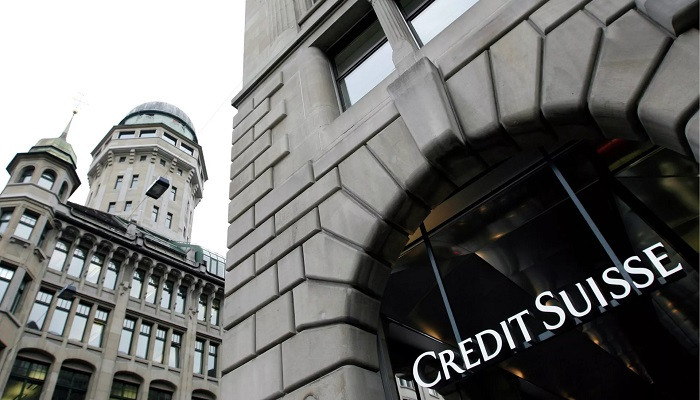UBS Close to Deal to Buy Credit Suisse for Over $2 Billion
 UBS UBS -5.50%decrease; red down pointing triangle Group AG is close to a deal to buy rival Credit Suisse CS -6.94%decrease; red down pointing triangle for more than $2 billion in an agreement engineered by Swiss regulators to prevent a crumbling of confidence in banks from spreading, according to people familiar with the matter. Swiss authorities on Sunday tried to make the deal happen before Asian markets opened for the week. They walked a fine line, needing to get the two banks’ boards to agree to the deal and avoiding the alternative, a regulator-led winddown of Credit Suisse, which could prove more protracted and painful for the financial system. To smooth the deal, the Swiss National Bank SNBN -1.52%decrease; red down pointing triangle has offered UBS around $100 billion in liquidity to help it take on Credit Suisse’s operations, according to the people familiar with the matter. Details of the liquidity offer couldn’t be learned. One option would involve UBS buying the entirety of Credit Suisse and then eventually spinning off its local Swiss operations into an independent entity, the people said, though it was possible UBS would hold on to the local Swiss bank. UBS would keep Credit Suisse’s valuable wealth-management and asset-management businesses. Discussions are continuing and the contours of the deal could still change as UBS and Swiss regulators hash out details of the plan and to what extent Swiss authorities would provide guarantees or backstops. Regulators have offered to waive a requirement for customary shareholder votes to expedite the sale, one of the people said. An issue in the discussions is what cost-saving UBS would be allowed to generate by Swiss authorities through moves such as job cuts, a key factor in how much UBS can afford to pay for the deal, the people said. UBS would only keep parts of Credit Suisse’s investment bank that fill gaps either geographically or in certain product areas where UBS lacks a presence. The price would be a substantial discount to Credit Suisse’s market value, which closed Friday at around $8 billion. UBS would be taking on large unknown costs and the complexities of integration. Some rich customers keep money at both banks and after a merger might decide to take some of their money to third parties for diversification purposes. Credit Suisse’s AT1 bonds are expected to be substantially written down, relieving some of the debt burden UBS would take on, according to some of the people familiar with the matter. An end to Credit Suisse’s nearly 167-year run would mark one of the most significant moments in the banking world since the 2008 financial crisis. It also would represent a new global dimension of damage from a banking storm started with the sudden collapse earlier this month of Silicon Valley Bank. Credit Suisse took a more-than-$50 billion Swiss National Bank liquidity lifeline this past week after concerns deepened about its prospects. The action didn’t do enough to stop the slide in Credit Suisse’s shares or stem the loss of bank deposits, compelling the central bank and Switzerland’s top financial regulator to orchestrate talks with Credit Suisse’s larger rival, UBS. The urgency on the part of regulators was prompted by an increasingly dire outlook at Credit Suisse, according to one of the people. The bank faced as much as $10 billion in outflows a day last week, this person said. The regulators feared that the bank would become insolvent next week if not dealt with, and they were concerned crumbling confidence could spread to other banks. UBS has long been seen as part of any state-backed solution for Credit Suisse, which has a balance sheet roughly half the size of UBS’s $1.1 trillion in total assets. Any full-scale takeover would give UBS prized businesses within Credit Suisse, such as wealth-management clients in Asia and the Middle East, but might come with less desirable units such as Credit Suisse’s troubled investment bank. It also could derail UBS’s existing strategy and perceived stability with investors. UBS has a market capitalization of roughly $65 billion, versus Credit Suisse’s $8 billion, according to FactSet. It made a $7.6 billion net profit in 2022, while Credit Suisse posted a $7.9 billion net loss. Credit Suisse’s local retail bank, a sticking point in the talks, could on its own be worth $10 billion, according to analysts. Combining it directly with UBS would create a domestic- banking behemoth with around 30% of the country’s domestic loans and deposits. Credit Suisse’s large legal bills are expected to be backstopped by the Swiss government and moved to a separate entity, according to one of the people. |

EU plans crypto ban for Russia, FT reports
70911.02.2026, 00:48
US Treasury Secretary says US sanctions crushed Iran’s economy and sparked protests (video)
83306.02.2026, 10:43
Elon Musk just became the first person ever worth $800 billion after SpaceX acquired xAI
77804.02.2026, 18:30
Xi Jinping calls for China’s renminbi to attain global reserve currency status
73801.02.2026, 23:05
Trump signs order allowing US to impose tariffs on countries supplying oil to Cuba
78630.01.2026, 12:17
EU Adds Russia to High-Risk Money Laundering List Strengthening Financial Controls
82730.01.2026, 00:37
